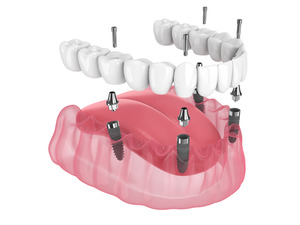
There are plenty of reasons why you may want to switch from traditional dentures to dental implants. Not only do implant posts offer better chewing power, but they will also help ensure that your replacement teeth don’t slip at unwanted times. Of course, you’ll naturally want to make sure you’re as prepared as possible before you begin the process; here’s what you can expect while making the transition from dentures to dental implants.
Before Your Dental Implant Surgery
Obviously, your dentist will have to make sure that you are a candidate for dental implants. This means examining your mouth and making sure there aren’t any issues that could affect your chances of having a successful dental implant procedure performed. Your dentist will also need to make sure that your jaw has enough bone density to support the implant posts.
If any problems are found, you may need to undergo preliminary procedures such as bone grafting before you can receive dental implants. These additional treatments can add a few months to the dental implant process. Your dentist can give you an estimate of what the timeline will look like so that you can plan accordingly.
After Getting Dental Implants
Once your dental implants have been placed, you can typically expect some level of discomfort and swelling for at least a few days. To keep yourself as comfortable as possible, you can take over-the-counter pain relievers; it may also help to apply a cold compress to any swollen areas.
You will be told to stick to a diet of liquid and soft foods for a while. The implant posts need time to fuse with the bone, and you don’t want to risk disrupting the process by putting too much pressure on them. Rest assured that once the implant process is complete, you will be able to enjoy all kinds of foods – including those that you might have had to avoid when wearing traditional dentures.
Speaking with dental implants is different than speaking with traditional dentures. You can speed up the adjustment process by giving yourself plenty of practice talking, such as by reading aloud or repeating difficult words.
Compared to dentures, dental implants are very easy to take care of. In fact, you can brush and floss them the same way you would your natural teeth. Just don’t forget to visit your dentist every six months so that they can make sure that your dental implants are still in good shape.
The transition from dentures to dental implants doesn’t happen overnight, but the benefits of having a lifelike smile supported by sturdy implant posts will be well worth it. Reach out to your dentist today if you’re ready to take the first step toward getting dental implants.
About the Author
Dr. A. Gary Goodman has more than four decades of dental experience. He has completed a mini residency in implant prosthetics and is a participant in the Chesapeake Implant Study Club. His Annapolis practice, Goodman Dental Care, offers in-office dental implant placement. To schedule a consultation with Dr. Goodman, visit his website or call (410) 263-1919.

